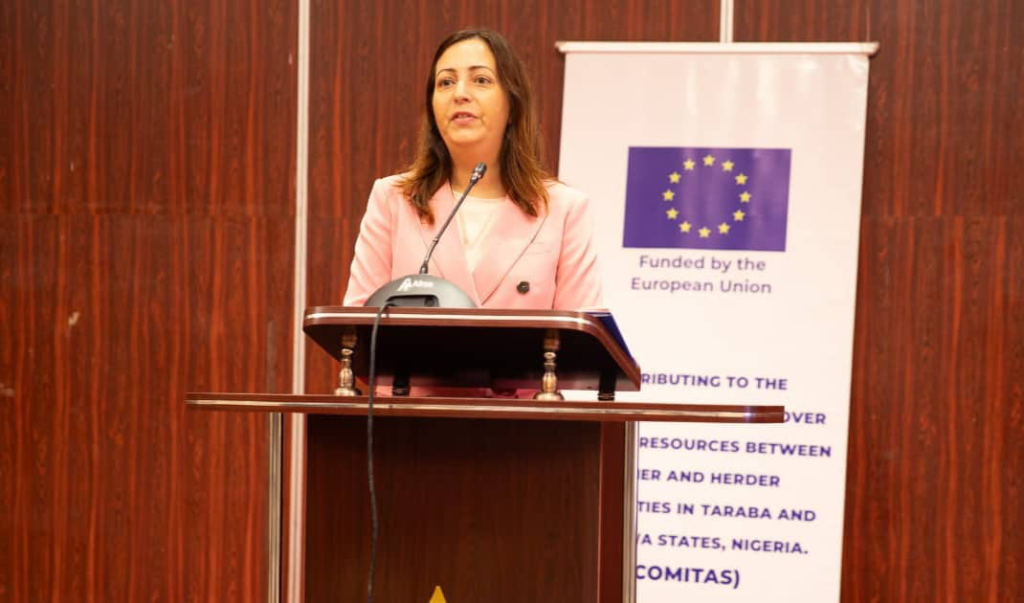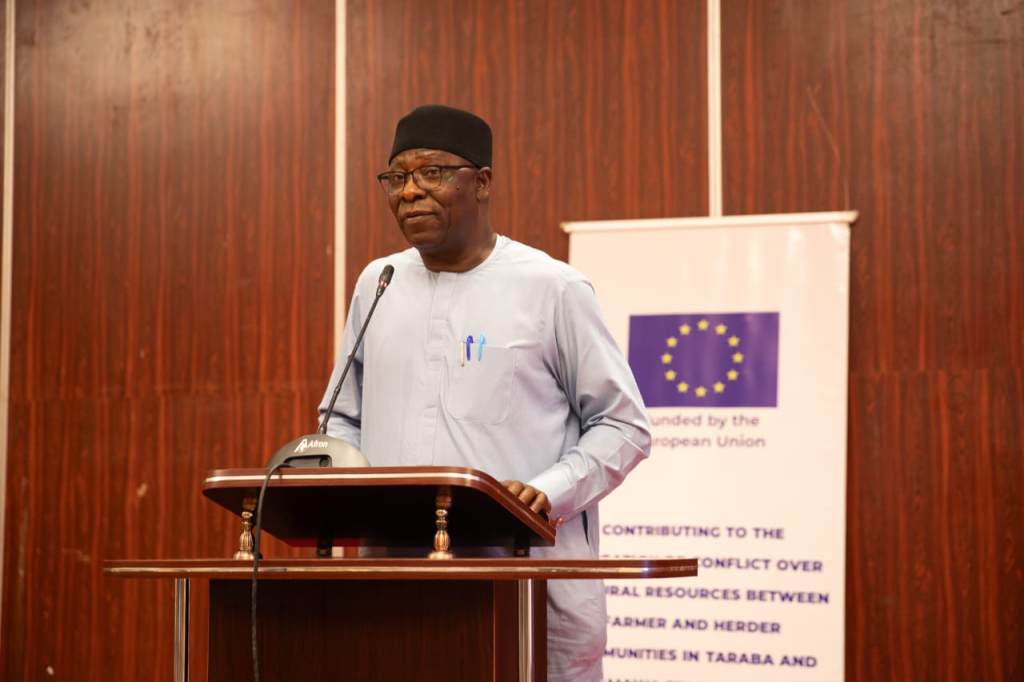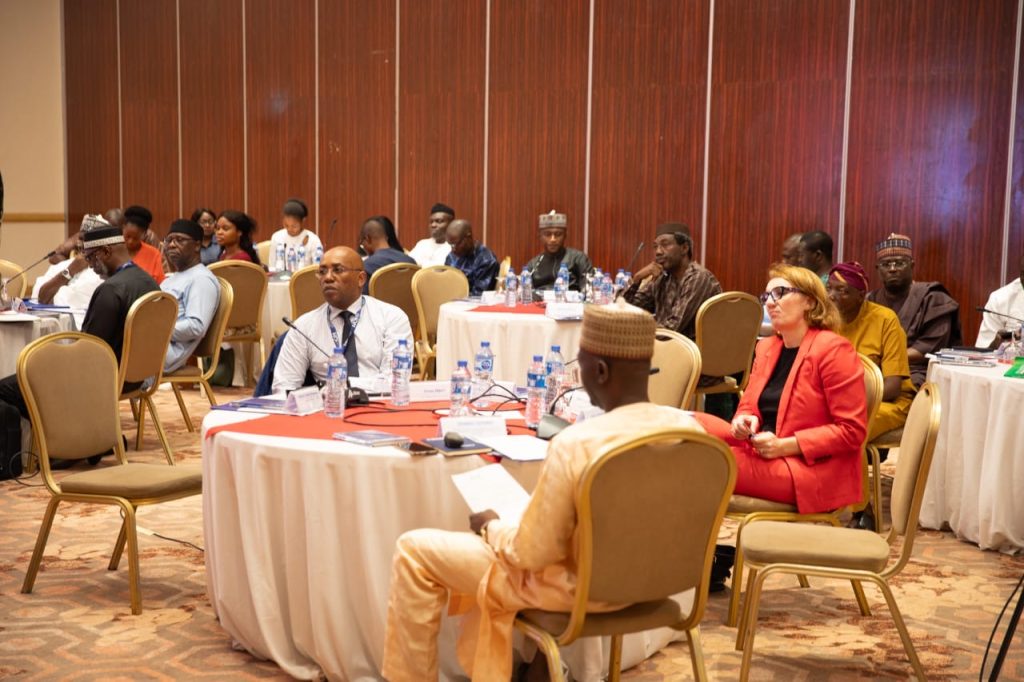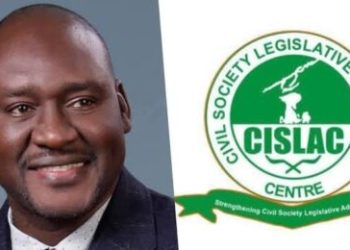By: Mnena Iyorkegh, Abuja
The International Organization for Migration (IOM) has empowered those affected by the conflicts between farmer and herder communities in Adamawa and Taraba States with improved livelihoods to strengthen social cohesion.
The IOM Chief of Mission in Nigeria, Ms Paola Pace, disclosed this in Abuja, during the third steering committee meeting to mark the official conclusion of the mission’s COMITAS project, COMITAS stands for: Contributing to the mitigation of conflict over natural resources between farmer and herder communities in Taraba and Adamawa States, Nigeria.

The UN Chief of Mission, also noted that the COMITAS has made significant impact on peacebuilding and conflict mitigation in Adamawa and Taraba states.
“COMITAS project has been a collaborative endeavour and the commitment of our partners, and the local communities has ensured we address the root causes of conflict in these regions. The success of the project can be seen in the establishment of 32 dialogue platforms, the implementation of Early Warning and Early Response (EWER) systems and enhancement of access to essential services such as water and infrastructure”

“Through EWER system, we empowered communities to prevent conflicts before they escalate. This system, combined with the monitoring of transhumance migration routes provided crucial tools for fostering peace and security”, she said
Ms. Pace, further commended the European Union for its financial support to the resolution of the farmer and herder crisis in Taraba and Adamawa States.
“On behalf of IOM, I extend my deepest gratitude to the European Union for their EUR 10.5 million grant through the Foreign Policy Instrument, which made this project possible. The partnership we have built over the past four years has been essential in addressing the root causes of conflict and creating lasting change. While this meeting marks the formal conclusion of the COMITAS project, we are confident that the systems and partnerships we have developed will continue to foster peace and development for years to come”, she commended
Also speaking, the Political Officer, Politics, Press and Information Section of the EU Delegation to Nigeria and ECOWAS, said the EU takes priority in creating resilient communities capable of managing disputes peacefully.

“The COMITAS project has been a key element in our broader strategy for Nigeria, which focuses on promoting peace, strengthening governance, addressing climate change and fostering human development. By tackling of the root causes of conflict ‘competition over natural resources’ COMITAS aligns with our goal of creating resilient communities capable of managing disputes peacefully”, she said
The Governor of Taraba state, .Agbu Kefas, represented by the Chief of Staff to the governor, Dr Jeji Williams, speaks on the government sustainability plan after the implementation of the project COMITAS
“The state government is considering establishing a peace commission. This peace commission is all-encompassing because it is like a bank whereby it will monitor the state where there are conflicts. The state can now intervene. And even this organization, it’s not as if they are pulling out. What are we going to do to sustain it? Now, that is a work in progress. And we are going to consider a lot of things that will give the state government the ability and the capacity to indulge in harvesting all the conflict-prone areas in the state and don’t tell it into the peace commission that is coming so that we will officially write these organizations”.
Dr. Williams added that Planing is key to sustainability of any programme.
“And one of those things they are going to do now is that if any state decides to establish a peace commission, they will back that state. But for how long it is going to take, the issue of sustainability still lives on because if you don’t come out with a design program that will live for like 20 years, 30 years, it will elapse.
So planning is very key. Planning for that peace commission is very key because that peace commission is going to connect to international organizations in the world. And that is where the sustainability comes in because if they are able to connect to European Union, Comitas, UNICEF, USID, and the rest of them, they will fund the program. But they will also like to see how much the state will put on ground to enable them coming”, he said
The Governor of Adamawa State, Ahmadu Fintiri, represented by the Chief of Staff to the governor, Dr Edgar Amos, disclosed that with the grants received from IOM and EU a lot of achievements have made.
“The COMITAS Project has been a remarkable success in Adamawa over the past four years. It has brought significant positive changes to our communities by addressing the conflicts between farmers and herders, which were driven by competition over scarce resources like land and water”,
“The project has promoted social cohesion by enabling peaceful dialogue and collaboration among these communities. Additionally, access to essential services has improved, with solar-powered boreholes providing much-needed water and infrastructure, stressed how positively the initiative has contributed to the state and community of Adamawa State”, he disclosed
The Staff Officer on Preventing and Countering Violent Extremism (PCVE), National Counter Terrorism Centre (NCTC) Office of the National Security Adviser (ONSA),
Mr Muhammad Aminu explained that the project has boosted efforts in tackling conflict.
“This project has made a lot of positive impact in the two states; we have visited the states and seen how your contribution has helped,” Aminu explained
The COMITAS II project was initiated based on the implementation of the first phase that was held in December, 2022, and implemented by (IOM) through partnership with Search for Common Ground (SFCG) and Mercy Corps, and funded by the European Union (EU).
The committee seeks to oversee the project implementation, make decisions and provide strategic guidance due to demographic growth, expansion of human settlements, privatization of land, year-round farming practices, environmental degradation, and climate change.














